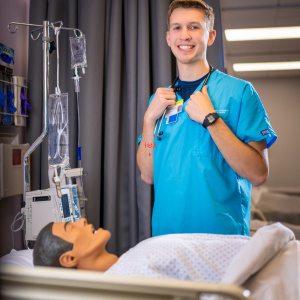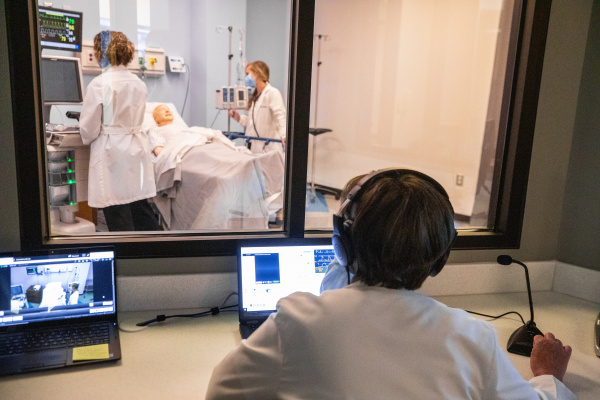Carter Hughes can’t pinpoint the month during his initial year at BJU when his interests segued from the physiology of exercise to the medical side of health care.
Like many college students seeking to home in on a career path they would find most fulfilling, introspection, classroom experiences and honest communication were Hughes’ guideposts.
He began to view nursing as a vocation.
“During my sophomore year of school, I talked with several nursing instructors, my now fiancé (an ICU nurse) and many other trusted friends and family. Through my conversations with these individuals, I could see how much the nursing faculty and staff loved their students and that they would do anything to see them succeed,” Hughes said. “Because of these conversations, I realized that nursing was the career I wanted to pursue and become a part of.”
Nursing has been a female-dominated profession since the days of Florence Nightingale, though men are increasingly joining the ranks and breaking stereotypes in the process. Attracted by the same sense of altruism and more tangible benefits that historically have drawn women, the share of male RNs in the U.S. workforce has risen from 2.7% in 1970 to 12% in 2019.
See Also: Bachelor of Science Nursing program | Online RN to BSN program
Abundant and wide-ranging opportunities, competitive compensation, and above all, personal satisfaction derived from making a difference in people’s lives appeals to males as much as their female counterparts. Gender isn’t a factor in providing compassionate patient care.
“From what I have seen, good nurses come in many shapes and sizes and have different strengths,” said Hughes, from Greenwood, Indiana. “I believe qualities that make up a good nurse include compassion, selflessness, initiative and the ability to advocate for their patients no matter what the circumstance. Nurses must also have the ability to think critically and swiftly to apply academic knowledge into clinical settings.”
Numbers Up at BJU
According to the U.S. Bureau of Labor Statistics, nursing is among the top growth occupations through 2029. Multiple factors, including an expanding elderly U.S. population requiring varying levels of care and increased access to health care overall, are driving opportunities for qualified nurses. About 176,000 openings are projected each year through the close of the decade when retirements and workforce exits are factored in.
Correspondingly, a four-year program is essential for individuals seeking specialized nursing positions with higher pay and more responsibility. The American Association of the Colleges of Nursing (AACN) requires the Bachelor of Science in Nursing (BSN), which has more depth and coursework than a two-year associate degree program, as the minimum educational requirement for professional nursing practice.
Fifteen male students were enrolled during the fall semester in BJU’s four-year bachelor’s degree in nursing program plus two adult learners in the RN to BSN program through the School for Continuing and Online Professional Education (SCOPE). Both are accredited by the Commission on Collegiate Nursing Association (CCNE).
“The quality of the nursing program here at BJU is outstanding, and now that I am a part of the nursing program, I personally see the hard work and dedication of the faculty and staff in our day-to-day interactions,” Hughes said. “Without the faculty and staff in the nursing program, I would not be where I am today.”
Six Semesters of Hospital-Setting Learning
BJU’s classes and patient simulation labs in the new School of Health Professions facility and six-semester clinical program in area hospitals provide students not only nursing competencies but develop leadership and managerial skills. Many other four-year bachelor’s degree nursing programs offer four semesters of clinical rotations.
“It’s fascinating to see them start their exposure in a clinical setting as a sophomore and then you see a big progression by the time you get to senior year, whereas if it’s just two years it’s such a compressed time,” said Megan Lanpher, chair of the Division of Nursing in the School of Health Professions. “Just having that extra time to process, to absorb, and as you’re learning you have five more semesters to use that knowledge. It gives them a longer time to practice their science and there’s more maturing that happens.”
See Also: Take a Virtual Tour of the School of Health Professions Facility
The BJU Core — liberal arts and Bible courses — complements the focused program in the School of Health Professions. “It’s foundational,” Lanpher said.
“Wherever the science falls (with COVID-19), there’s a very real human condition of uncertainty and fear about the disease. Our students have that unique ability to pull Christlike love into it that their secular counterparts are not trained in. One of our program learning outcomes is that students will exercise a biblical worldview that shapes their ethical practice, how they communicate, how they critically think, how they treat their patients and co-workers.”
At 93%, BJU nursing graduates consistently outperform the national pass rate on the NCLEX-RN exam.
Males Bring Subset of Skills
The hierarchical system that existed in hospitals — “… you had a physician who gave orders and you had people who executed those orders, maybe traditionally without much discussion and certainly without a lot of collaboration,” Lanpher said — has evolved over the past 25 years.

“I have been told by many patients and friends that their favorite nurses were male nurses.”
Nurses are recognized as full participants within a team of interdependent health care professionals.
“Because the nurse is trained so extensively at the bedside — and all our clinicals are at the bedside with patients — the communication skills that our nurses have are intended to connect the physician with others on the team, such as the therapist or social worker,” Lanpher said. “That good nurse that we want to train because they’re at the bedside, can pull everyone together. That allows nurses to exercise a lot of autonomy. That will attract not just the traditional population that’s pursued nursing but a lot of men can find a lot of fulfillment in that coordination of care.”
Male nurses in a hospital setting ensure that male patients are well represented and that male health care needs are fully understood.
“What you’ll find increasing in patient populations is there is increasing trust with male nurses,” Lanpher said. “Men like Carter have the ability to communicate that compassion and communicate leadership and communicate knowledge. Male nurses bring their own subset of skills that are highly valuable to that nursing team.”
Added Hughes: “In my clinical experience as well as in classes there hasn’t been a stigma of being a ‘murse.’ In fact, it has been quite the opposite as there are fewer male nurses in the field and they frequently have good reputations, making it easier for those behind to follow. I have been told by many patients and friends that their favorite nurses were male nurses.”
Opportunities to Explore
Flexibility — nursing is a unique field that allows for part-time or full-time work, per diem and combination shifts — and specialties such as emergency room or intensive care unit nurses, certified registered nurse anesthetist, nurse practitioner, flight nurse, nursing informatics and traveling nurse are often sought out by male RNs.
About 76% of men work in hospitals compared to 61% of women, who are also represented in private practice offices, health care agencies, outpatient clinics and skilled nursing facilities, among others. Men’s representation in a specialty is highest among nurse anesthetists (41.1%) and other career opportunities are growing.
“After I receive my bachelor’s degree, I am looking to pursue a career in the emergency department or an intensive care unit,” Hughes said. “In the future, I hope to pursue higher education and become a nurse practitioner to expand my scope of practice in either of these departments.”
Said Lanpher: “The attractive part of it is the return on their investment. You can go anywhere.”








